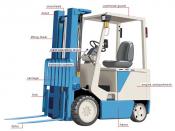Smarna Gora Holdings, a company based in Slovenia, Yugoslavia. The company was functioning in a socialist economy system in 1990, and focused only on production. In 2001, Smarna Gora has gone under an organizational change, and began its operation in a transitional capitalist system and open to global market competition. Due to its ongoing financial difficulty and the reduction of productivity, a number of factories are combined and number of employees was also reduced. In the fork-lift truck factory, the manager, Igor Pavlin has identified that improvement is needed the areas of learning, and management and employee development within the factory. Such improvements are influenced by pressures from within and outside of the organization. A prioritized action plan therefore is very important for both management and employee development in Smarna Gora.
There are number of external and internal pressures that are affecting the learning and development in the factory. These pressures can be either positive or negative.
Internally, for the positive pressures, since the company is operating in the socialist system in 1990, the company is production focused. Due to the company is situated in an exclusive market in Yugoslavia; therefore it need not compete with others European countries. Planning in the organization level is not required, it need not to emphasis on its market; or neither on its management. After the company has gone downsizing in 2001, the reduction of factories and employees and skill shortage due to change of technology and ongoing cash-flow problem and bad debts have created negative pressures. Implementation of ISO 9001 quality management system, recruitment of specially skilled worker and technical personnel has brought in positive pressure to the learning and development in the factory.
Externally, political changes, economic downturn, strong trade union influences, strikes during mid-1990 generated negative pressures to the company. The...


